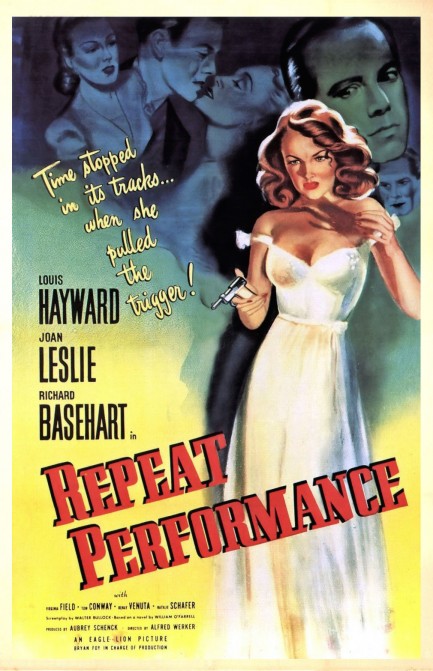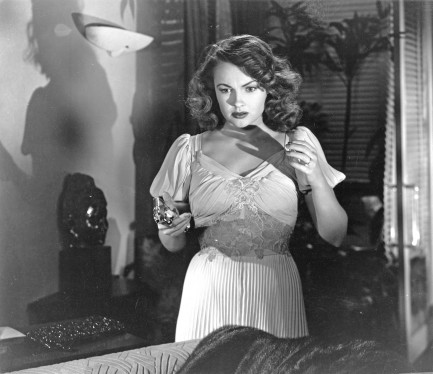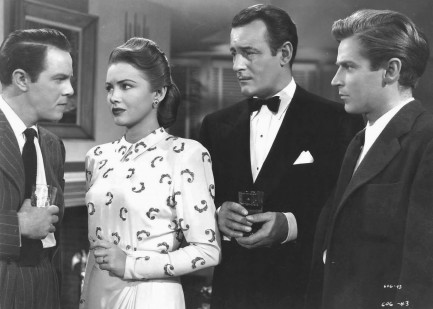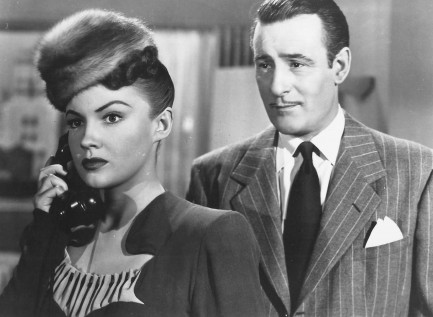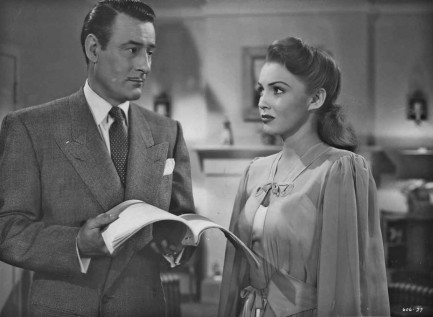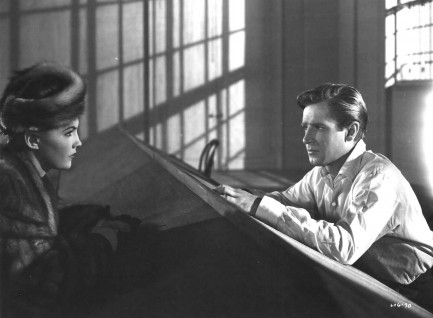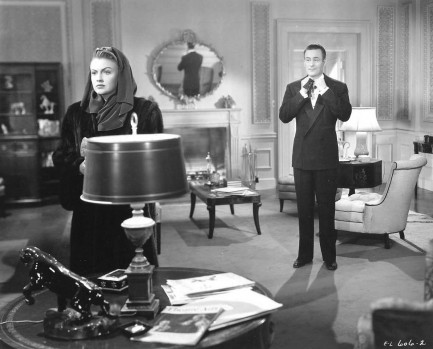 He was a good husband at first. Then he turned into a total ape. 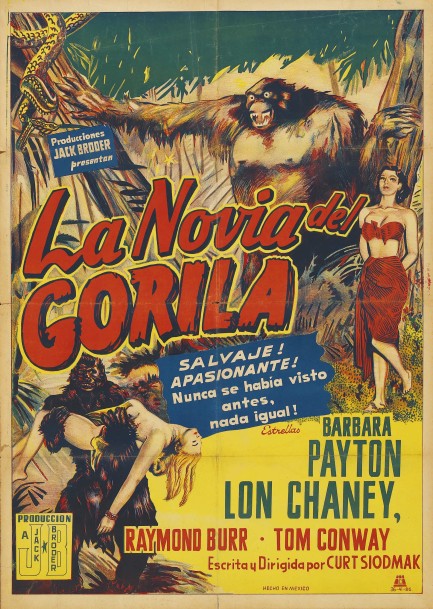
This Mexican poster for La novia del gorilla, aka Bride of the Gorilla, is chockful of interesting elements, from the massive simian at top, to the snake hanging in a tree, to star Barbara Payton being borne away by a second gorilla, and co-star Carol Varga in her classic “native” two-piece. There's a line early on: “White people shouldn't live too long in the jungle. It brings out their bad side—jealousies, impatience.” That sums up the thrust of the plot, the subplot, and the underlying themes, because it's a one-note psychological suspense flick about northerners out of place in the humid global south.
In brief, Raymond Burr runs a rubber plantation for colonial boss Paul Cavanaugh, and has the hots for his wife Barbara Payton. He kills Cavanaugh, thanks to a serendipitous lethal snake that's slithering by. He gets away with the murder, but he can't fool the withered old crone who runs the plantation house. She uses the pe de guine—the so-called plant of evil—to place a curse on Burr. It's slow to act, but by the time he marries the widowed Payton he comes to think he's changing into a beast. Is it in his mind? Is he suffering the effects of slow poisoning from the pe de guine? Or is he really a monster?
Bride of the Gorilla, while a middling and basically inconsequential cinematic effort, is well remembered by Hollywood buffs for its extracurriculars. Barbara Payton was being surveilled via detective by her husband Franchot Tone, and passed on the unfortunate news that Payton was enjoying sweaty horizontal interludes with Woody Strode. He was one of the best looking guys you can imagine, so it's no wonder the highly sexed Payton got hot and bothered. It was one in a series of affairs for her, but this one harmed her career because Strode was black. She would later suffer one of the more infamous downward spirals in celebrity history.
In any case, the question is should whether you give Bride of the Gorilla a screening. Hmm... well, owing to the good cast, we think so. Chaney and Burr are quality talents even when overrmatched by substandard screenwriting, and Payton had been an acclaimed actress in earlier roles and is certainly decent here. But keep your expectations in check. It's watchable, but it's still pure b-movie schlock. It was originally released in the U.S., and opened in Mexico today in 1951 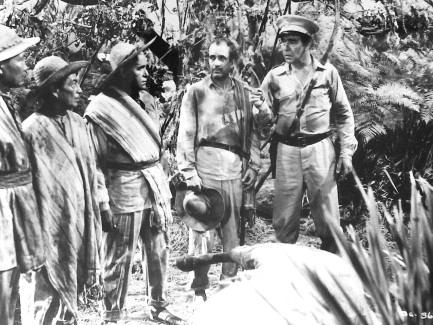 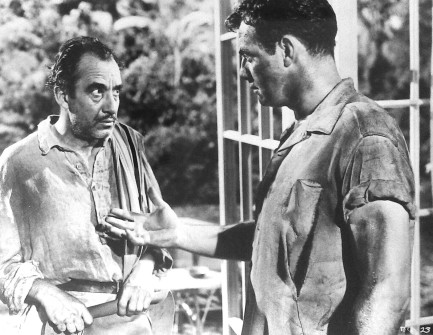 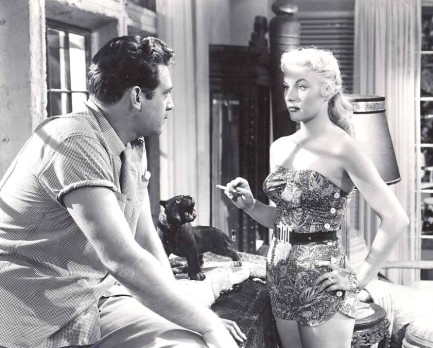 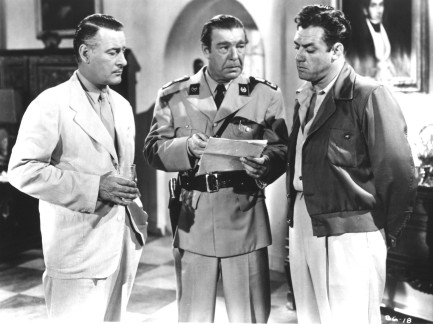 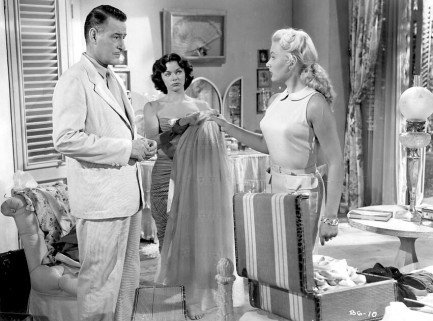 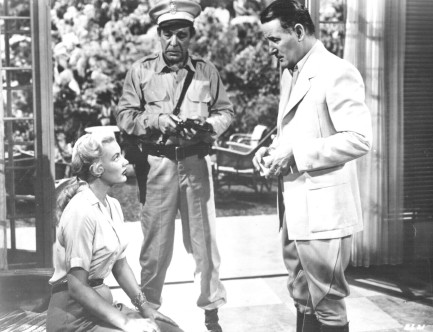 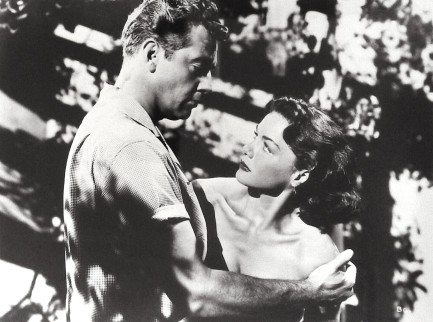 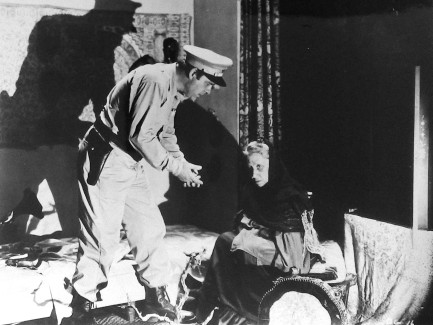 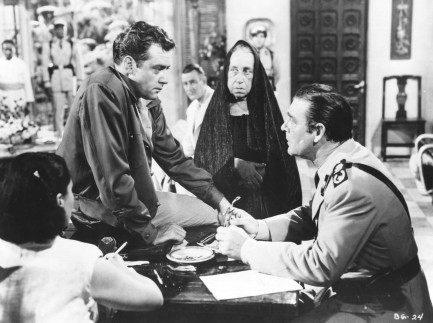  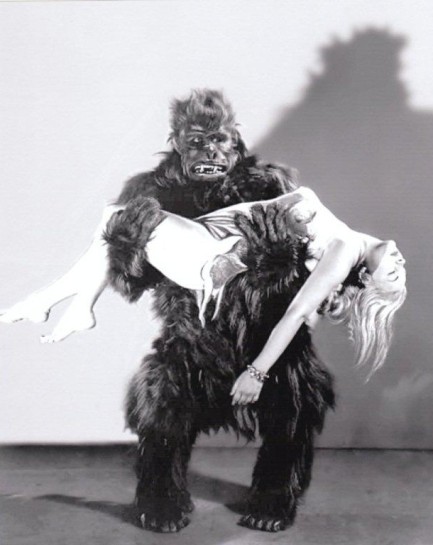
 The toughest case to solve is a case of amnesia. 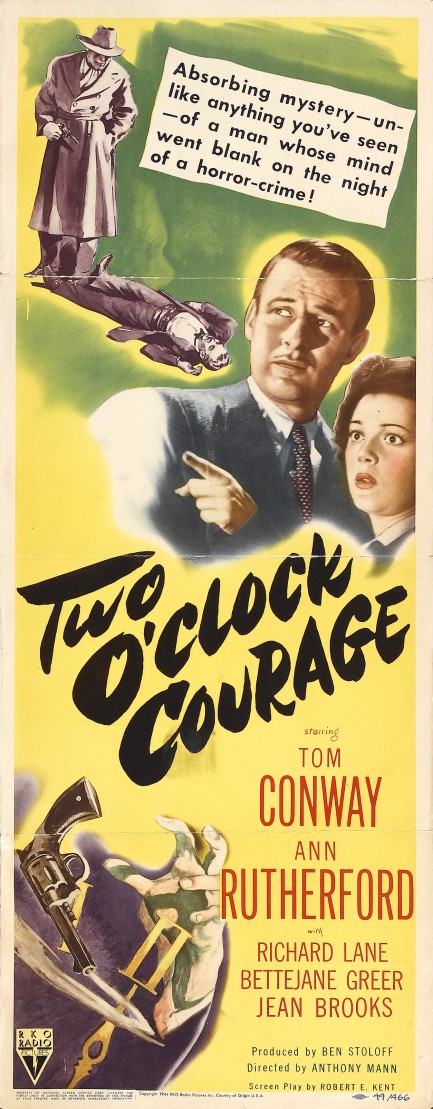
The poster above was made to promote the mystery Two O'Clock Courage, an interesting little noir-adjacent obscurity released today in 1945. It was directed by Anthony Mann of T-Men fame, and stars Tom Conway as a hapless everyman and Ann Rutherford as a cabbie who almost runs him over, but instead takes him under her wing. Conway needs help, you see, because he's been bonked over the head, and has no clue by whom or why. In fact, he doesn't remember anything before meeting Rutherford. Everything is a big fat blank. With his brain back to factory reset, he's a nice enough guy, but he soon learns that Rutherford found him near the scene of a murder. Did he have anything to do with it? He fears he might have. He and Rutherford pair up to sleuth their way to a solution, with cops and the press underfoot all the while.
The movie, while a mystery, also aims for laughs in the style of The Thin Man, with quips, wacky secondary characters, Bettejane Greer (Jane Greer) comically overacting the effects of alcohol, and an inspector who's entirely too willing to defer authority to nosy amateurs. Maybe it was uproarious in its day, but in our day it's a bit tedious. The problem is Conway's stumbling, stammering performance. A little more agency and competence would have played better, in our opinion. His all thumbs persona isn't a dealbreaker, though, thanks to Rutherford's presence. The two even manage to generate a few legit chuckles. As for the mystery, they're pretty bad as sleuths, but they eventually solve it, because with respect to cinematic amnesia you can always count on one thing—it's easy come, easy go.
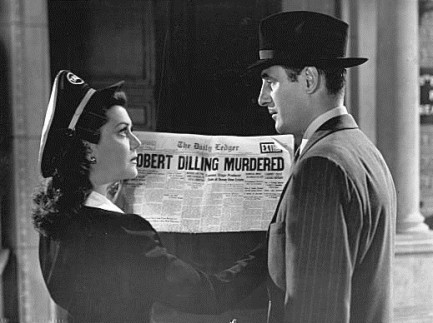 So you really have total and complete amnesia? So you really have total and complete amnesia?
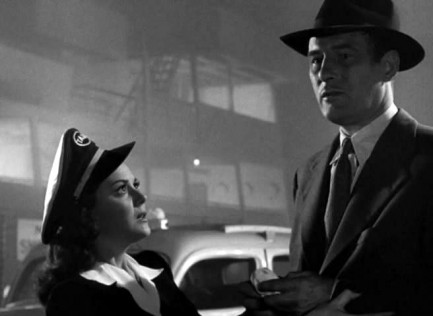 I guess you don't remember, but I've let you ride in my cab, like, hundreds of times and you owe me probably three grand. Cash only, please. I guess you don't remember, but I've let you ride in my cab, like, hundreds of times and you owe me probably three grand. Cash only, please.
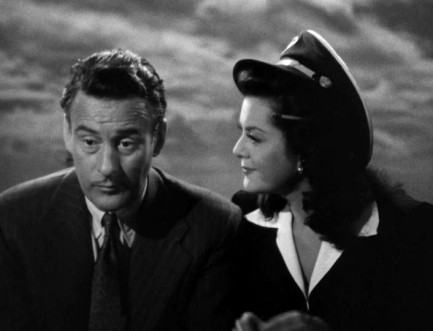 Oh, also we've had dozens of wild, carnal nights together. Since you forgot we better do all those again. Oh, also we've had dozens of wild, carnal nights together. Since you forgot we better do all those again.
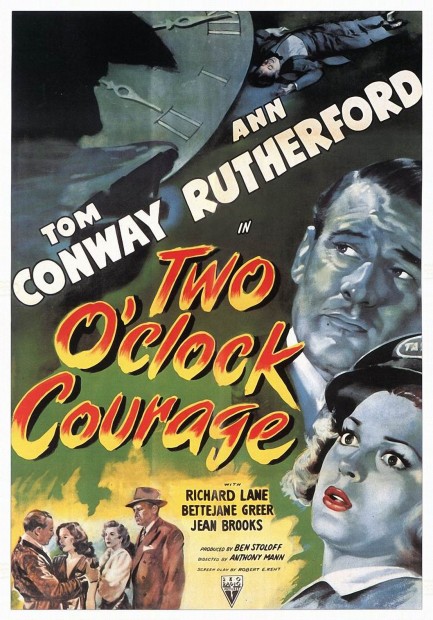
 George Raft and Ava Gardner are lost in tepid 1946 drama. 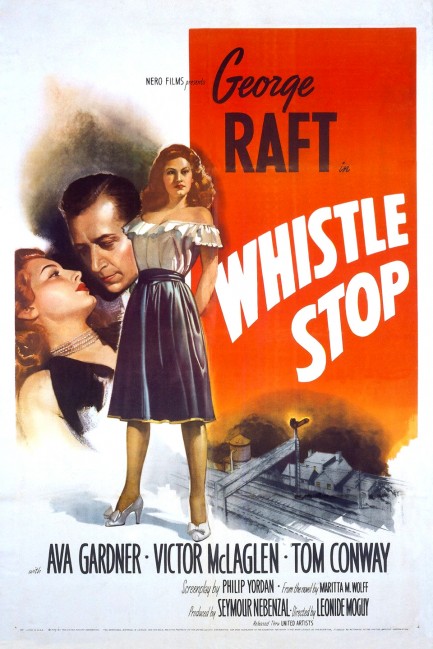
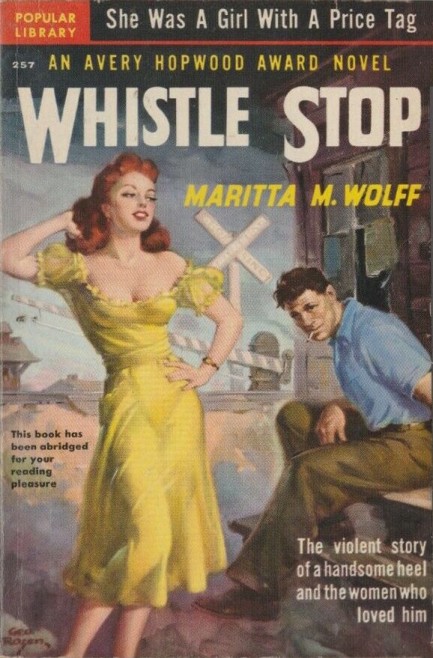 A whistle stop, for any who don't know, is a term for a small town, a place where a train pulls in for a few minutes before moving on. 1946's Whistle Stop is based on Maritta M. Wolff's acclaimed novel, published when she was just twenty-two. It was not only acclaimed, but controversial, as its frank language scandalized bluenoses of the era. A whistle stop, for any who don't know, is a term for a small town, a place where a train pulls in for a few minutes before moving on. 1946's Whistle Stop is based on Maritta M. Wolff's acclaimed novel, published when she was just twenty-two. It was not only acclaimed, but controversial, as its frank language scandalized bluenoses of the era. In the film, Ava Gardner returns from Chicago to her whistle stop home town and gets tangled up up with her ex, George Raft, who's a gambler and all around shady guy. Tom Conway has feelings for Gardner and hates Raft, and the rivalry leads to big trouble as both try to win Ava's affections. She doesn't help the situation with her fickleness. Each time Raft makes her mad she turns to Conway. Nothing good can result when hearts are used as toys. This is another one of those old films that, because it has some night scenes and a partial crime focus, is labeled on some sites as a film noir. That's way off and you'll be disappointed if you watch it expecting noir. It's actually a melodrama, with star-crossed lovers, sweet violins, and a dance sequence set to the 1848 folk classic “Oh, Susanna.” Even Variety at the time called it “heavy melodrama.” There's a heist in the film, but heists happened in the movies before, after, and outside film noir. Raft is supposed to take part in the robbery, which as a bonus would result in the death of his rival Conway. Think things work out as planned? Not quite. We wanted to like Whistle Stop, because Gardner is ravishing, but it's not up to the standard of most old films. It premiered today in 1946.
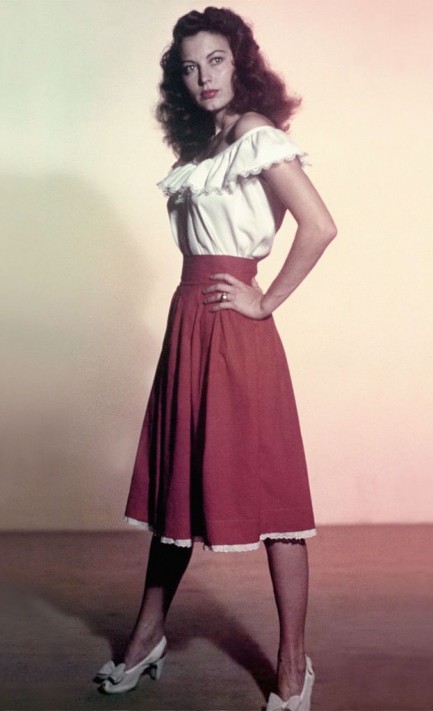
|
 |

The headlines that mattered yesteryear.
2003—Hope Dies
Film legend Bob Hope dies of pneumonia two months after celebrating his 100th birthday. 1945—Churchill Given the Sack
In spite of admiring Winston Churchill as a great wartime leader, Britons elect
Clement Attlee the nation's new prime minister in a sweeping victory for the Labour Party over the Conservatives. 1952—Evita Peron Dies
Eva Duarte de Peron, aka Evita, wife of the president of the Argentine Republic, dies from cancer at age 33. Evita had brought the working classes into a position of political power never witnessed before, but was hated by the nation's powerful military class. She is lain to rest in Milan, Italy in a secret grave under a nun's name, but is eventually returned to Argentina for reburial beside her husband in 1974. 1943—Mussolini Calls It Quits
Italian dictator Benito Mussolini steps down as head of the armed forces and the government. It soon becomes clear that Il Duce did not relinquish power voluntarily, but was forced to resign after former Fascist colleagues turned against him. He is later installed by Germany as leader of the Italian Social Republic in the north of the country, but is killed by partisans in 1945.
|

|
|

It's easy. We have an uploader that makes it a snap. Use it to submit your art, text, header, and subhead. Your post can be funny, serious, or anything in between, as long as it's vintage pulp. You'll get a byline and experience the fleeting pride of free authorship. We'll edit your post for typos, but the rest is up to you. Click here to give us your best shot.

|
|















 So you really have total and complete amnesia?
So you really have total and complete amnesia? I guess you don't remember, but I've let you ride in my cab, like, hundreds of times and you owe me probably three grand. Cash only, please.
I guess you don't remember, but I've let you ride in my cab, like, hundreds of times and you owe me probably three grand. Cash only, please. Oh, also we've had dozens of wild, carnal nights together. Since you forgot we better do all those again.
Oh, also we've had dozens of wild, carnal nights together. Since you forgot we better do all those again.


 A whistle stop, for any who don't know, is a term for a small town, a place where a train pulls in for a few minutes before moving on. 1946's Whistle Stop is based on Maritta M. Wolff's acclaimed novel, published when she was just twenty-two. It was not only acclaimed, but controversial, as its frank language scandalized bluenoses of the era.
A whistle stop, for any who don't know, is a term for a small town, a place where a train pulls in for a few minutes before moving on. 1946's Whistle Stop is based on Maritta M. Wolff's acclaimed novel, published when she was just twenty-two. It was not only acclaimed, but controversial, as its frank language scandalized bluenoses of the era.

